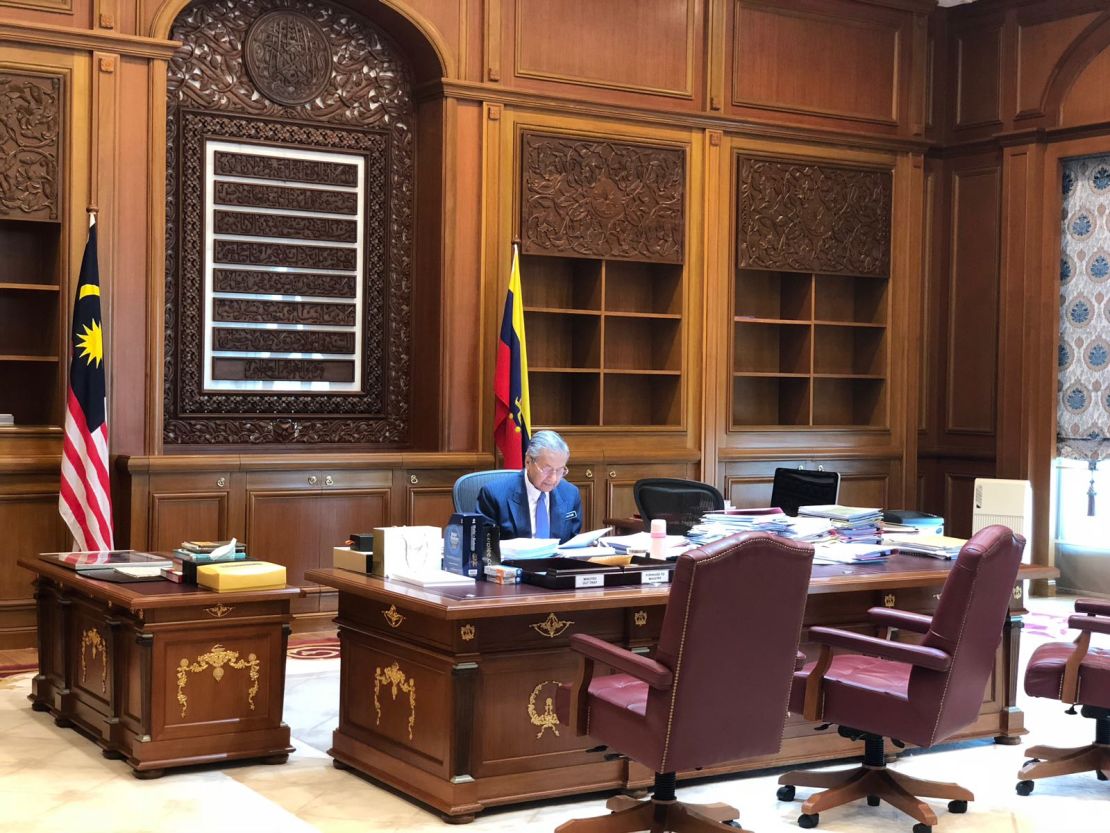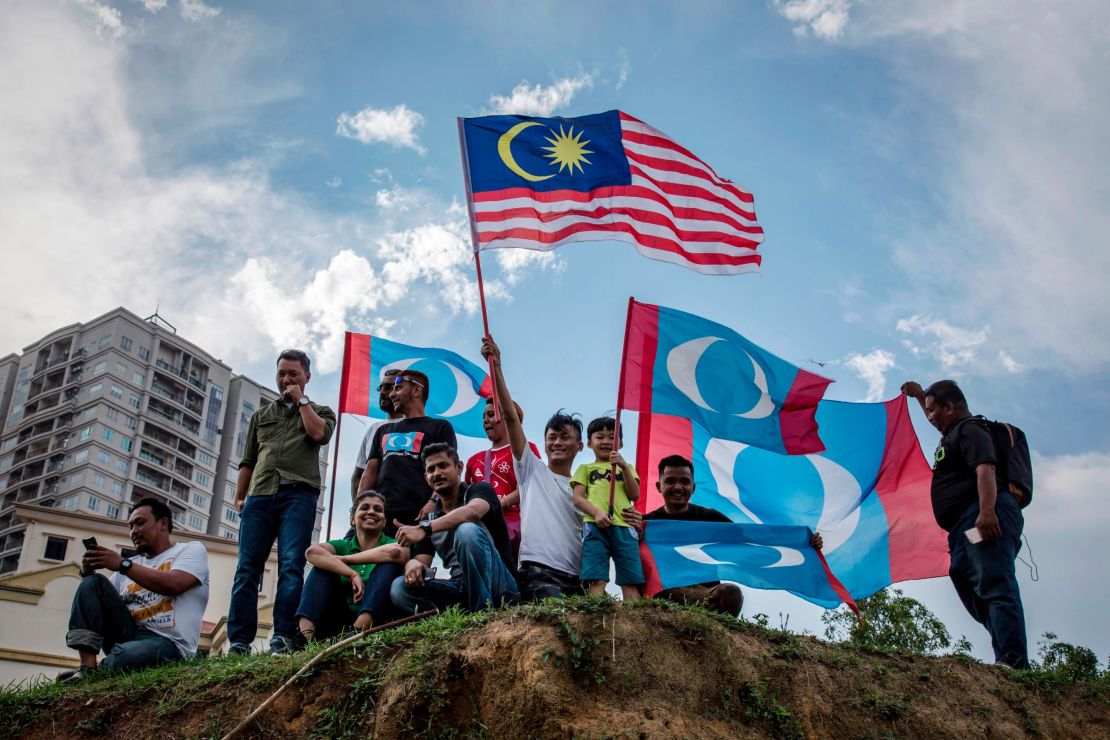Malaysian Prime Minister Mahathir Mohamad, who staged a stunning election upset earlier this year to return to power aged 92, said he inherited a government lousy with corruption and with few trustworthy officials.
“From outside we saw the damage, but we never expected the damage to be so extensive,” he told CNN at his offices in Putrajaya, south of the capital Kuala Lumpur. “Most of the top echelons in the government are corrupt.”
Mahathir’s predecessor and former protege Najib Razak has been charged with multiple counts of corruption for allegedly embezzling millions in public money from Malaysia’s 1MDB fund.
“I have to work with some of those people who are suspect,” Mahathir said. “It’s a very difficult job, if you don’t work with people you trust, you don’t know whether what you want them to do will be done or not.”
Malaysia ranked 62 of 180 countries in Transparency International’s most recent global corruption index, with the NGO’s local affiliate warning that corrupt officials have been able to “stash their ill-gotten gains in their house or foreign banks and invest them in luxurious mansions, expensive cars or lavish lifestyle for their children with total impunity and in blatant disregard for the citizens they are supposed to serve.”
As well as widespread corruption and the case against Najib, Mahathir is also facing significant foreign policy challenges, as Malaysia faces a more aggressive China and the fallout from US President Donald Trump’s trade war.

Succession plans
Now 93, Mahathir is the world’s oldest leader, 21 years older than Trump and more than twice the age of Canadian Prime Minister Justin Trudeau.
Credited with turning Malaysia into a major trading and economic force in Southeast Asia, Mahathir left politics in 2003, but he returned with a vengeance this year, determined to oust Najib, who he blasted as corrupt and dictatorial.
To do so, he teamed up with former Deputy Prime Minister Anwar Ibrahim, who Mahathir himself once jailed, to lead a coalition of opposition parties which succeeded in toppling Najib in a landslide.
Now Mahathir is back at the seat of power: literally, his staff said he uses the same desk as during his previous premiership.
Soon after the win, Anwar, who had been in prison on sodomy charges, received a royal pardon, and both men have talked of him eventually replacing Mahathir as Prime Minister.
“If the condition for us working together is my serving as Prime Minister for two years or three years, for me that is not important,” Mahathir said. “I will abide by the wishes of the people.”
He said his personal opinion of Anwar did not matter – “I have to trust him whether I like it or not. I can’t be here all the time.” – though he added if “people want me to serve” beyond the time agreed with his coalition partners, then he would stay in power.
Anwar is expected to run in a by-election in the near future in an effort to rejoin parliament, allowing him to replace Mahathir as Prime Minister.
Caught between China and US
Mahathir’s keenness to remain in office may be lessened once he begins the task of tackling the many challenges – both at home and overseas – facing his government.
Najib had pulled Kuala Lumpur close to Beijing, signing up to Chinese President Xi Jinping’s much vaunted Belt and Road trade and infrastructure initiative.
Mahathir, however, has so far appeared more cautious.
This month, Malaysia canceled a multibillion-dollar China-backed rail project after a government assessment found it was some $20 billion over budget.
“We have always been friendly with China,” Mahathir told CNN. “There’s a saying, ‘the powerful will take what they will, the weak will yield what they must.’”
Referring to Beijing’s increasingly assertive behavior in the South China Sea – which it claims almost all of as its territory, including islands claimed by Malaysia – he added “we cannot go to war with them.”
“They are more powerful, and we cannot fight against them, (so) how do we benefit from their wealth and their power? That’s what we are looking at now,” Mahathir said. “We have to accept the reality of the situation.”
He accused China of seeking to “spread its influence using the money that it has,” and said while China-backed mega projects are welcome in Malaysia, he didn’t want the government or businesses to be reliant on borrowing Chinese money.
Some experts have warned Belt and Road projects may pile debt onto smaller countries, putting China in a strong position to influence their strategic decisions or even gain control of important infrastructure.
Mahathir’s second major foreign policy concern is the other Pacific power: The United States. He has previously criticized Trump as a bully and expressed concern he could destabilize the region’s security or economy.
“Trade war does not do anything good for the world,” he said of Trump’s recent economic policies.”He asked for things which are quite, quite unacceptable. For example, he wants to build a wall to separate Mexico from the US, and he is asking the Mexicans to pay. It’s your project, you pay! But is it because he thinks he’s powerful so he can ask people to pay for what he wants to do? So how do you deal with that kind of mindset?”
He added that a trade war would hurt everyone: “The US will lose, China will lose, the whole world will lose. War and trade wars (don’t) solve any problems.”

Terrorism threat
Malaysian security concerns aren’t limited to Chinese warships in the South China Sea. Like many of its neighbors, Kuala Lumpur has faced a growing threat of Islamic terrorism, fueled by returnees from the Middle East and the proliferation of groups affiliated with the so-called Islamic State, or ISIS.
Last year, an ISIS-allied militant group was driven out of the southern Philippines city of Marawi by a concerted military campaign. The group included multiple Malaysians, including financier Mahmud Ahmad, considered one of Malaysia’s most influential jihadists and the assumed source of funding for the Marawi operation.
Malaysia, the Philippines and Indonesia have been stepping up security cooperation, particularly in the largely ungoverned border areas where militant groups are known to shelter.
“It is a threat to our country but you know, we tried to counter terrorism with very sophisticated ways and all that using new technology to fight terrorism, but terrorism has a reason, it has a cause,” Mahathir said. “You have to (tackle the) cause of terrorism, if you can tackle the cause and remove it, then there won’t be terrorism.”
He added that no one can win a guerrilla war, which “can only be fought within the hearts and minds of the people,” and blamed extremist religious leaders for fueling violence.
“Islam that you see today is not actually the Islam that is taught by the religion. It is the Islam interpreted by certain powerful people, leaders, scholars and all that,” Mahathir said. “Islam of the Quran is a very moderate Islam. (It) calls upon all Muslims to be brothers, it forbids killing, but (they) are doing all those things which are forbidden by Islam.”
Anna Coren, Ellana Lee and Jane Sit reported from Kuala Lumpur, Malaysia. James Griffiths wrote from Hong Kong. CNN’s Euan McKirdy contributed reporting.









